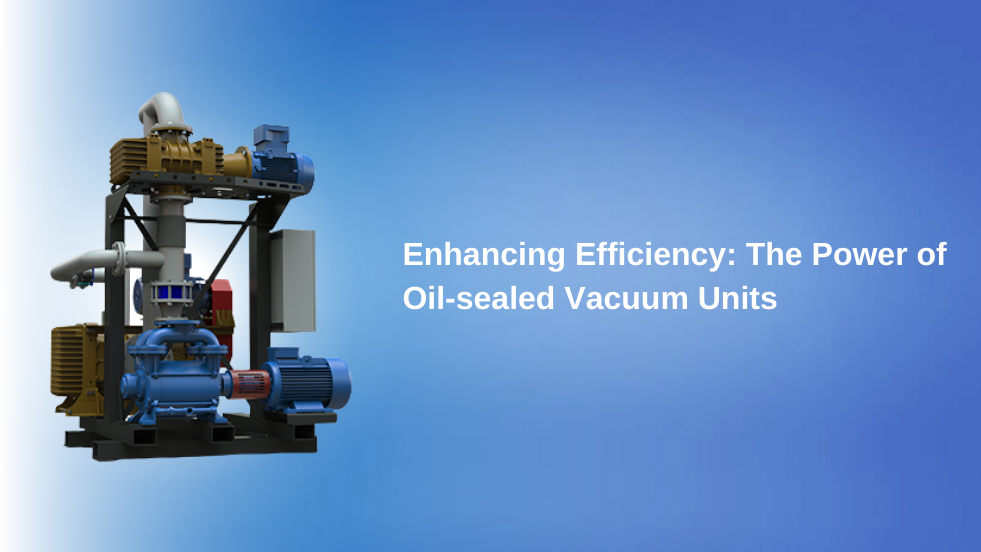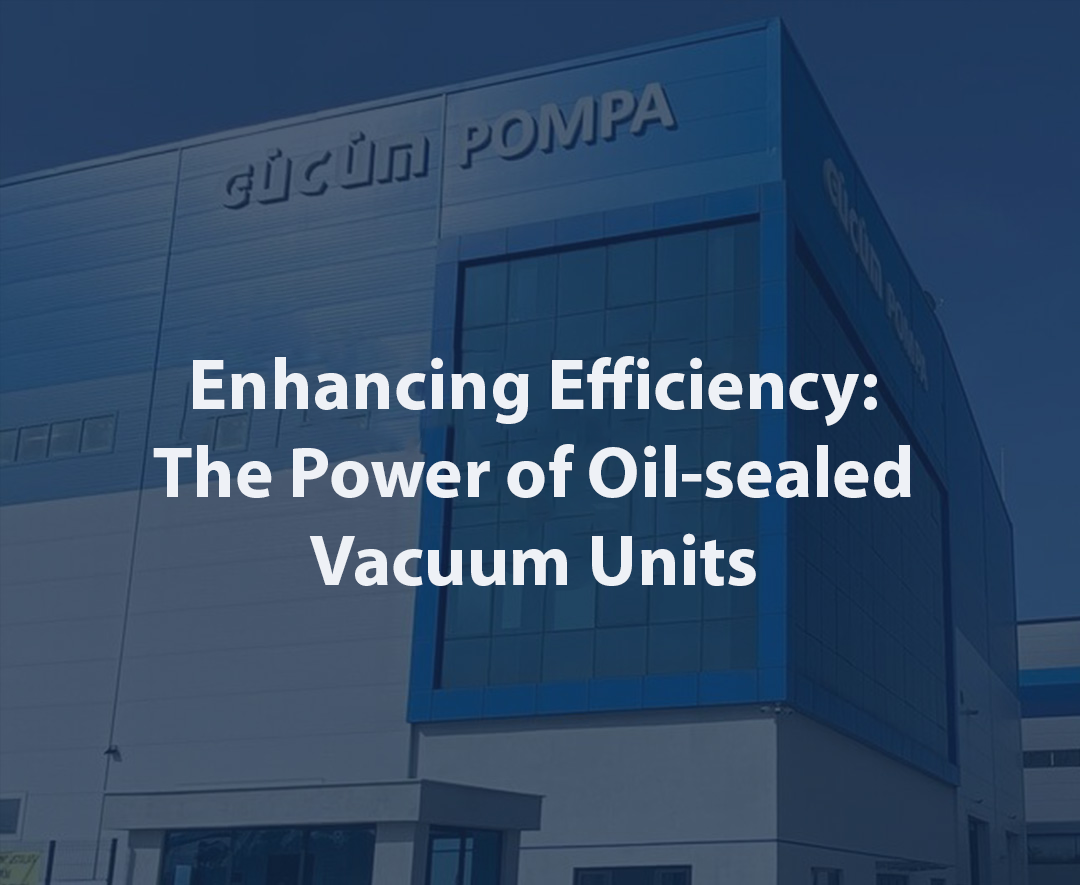Enhancing Efficiency: The Power of Oil-sealed Vacuum Units
Contents
- What is an Oil-Tight Vacuum Unit and How Does It Work?
- What is the Contribution of Oil-Tight Vacuum Units to Productivity?
- In Which Sectors Are Oil-Tight Vacuum Units Used?
- What are the Advantages of Oil-Tight Vacuum Units?
- What Should Be Considered When Choosing an Oil-Tight Vacuum Unit?
- How to Maintain and Clean Oil-Tight Vacuum Units?
- Do Oil-Tight Vacuum Units Save Energy?
- Oil-Tight Vacuum Unit Prices and How to Make Cost Analysis?
- What Should Be Done in Case of Failure in Oil-Tight Vacuum Units?
- What are the alternatives to oil-tight vacuum units?
- What are the differences between oil-tight vacuum units and dry type vacuum pumps?
- How to Choose the Best Oil-Tight Vacuum Unit for Business?
What is an Oil-Tight Vacuum Unit and How Does It Work?
Oil-tight vacuum units are mechanical systems used to obtain high vacuum power in industrial applications. These units allow gases and air to be expelled to create a low-pressure environment. Its working principle is based on the fact that the rotating parts inside create a pressure difference by sealing them with oil. Oil both extends the life of mechanical parts by reducing friction and provides sealing during the vacuuming process. This feature contributes to the unit providing reliable and stable performance.
The operating system of these units usually involves creating a vacuum with rotary vane pumps. As the rotor moves through the oil, it creates a vacuum and expels gases. In this process, oil functions as a coolant and cleaner, allowing the device to operate more efficiently. Special filtering systems are used to prevent the oil from evaporating. In this way, there is no loss of performance in applications that require long-term operation. These systems, which have a wide range of uses from industrial production lines to laboratory applications, are the ideal solution for businesses that need high vacuum power.
What is the Contribution of Oil-Tight Vacuum Units to Productivity?
Oil-tight vacuum units make significant contributions to businesses in terms of energy efficiency and high performance. The sealing of the oil in maintaining the vacuum level allows the units to operate uninterrupted for a long time. This means saving time and energy in production processes. The friction-reducing effect of the oil prevents wear, reduces maintenance costs and extends the life of the unit.
These devices enable processes to be accelerated, especially in production lines that require automation. It increases the quality when used in vacuum packaging and sterilization processes of products in the food, chemical and pharmaceutical industries. It reduces the energy costs of businesses thanks to its structures that optimize energy consumption. Oil-tight vacuum units offer an economical and reliable investment option for businesses that want to increase efficiency.

In Which Sectors Are Oil-Tight Vacuum Units Used?
Oil sealed vacuum units are used in a wide range of industries. While it is preferred in vacuum packaging processes in the food industry to extend the shelf life of products, it is used in the medical field to ensure hygiene in sterilization processes. It increases production quality by providing high precision in distillation and evaporation processes in the chemical and pharmaceutical industries.
It offers reliable solutions in mold production in the automotive industry and plastic injection processes. While it is used to provide air tightness in semiconductor production in the electronics industry, it is preferred in moisture removal processes in the textile and paper industry. In sectors where vacuum technology-based applications are intense, these units stand out as an important component that meets efficiency and quality standards.
What are the Advantages of Oil-Tight Vacuum Units?
Oil-tight vacuum units offer many advantages such as high vacuum capacity and durability. The oil sealing makes it easier to maintain the vacuum level and ensures that the unit operates at high performance for a long time. Their energy efficiency optimized design reduces operating costs and provides an environmentally friendly solution.
It provides comfort in workplaces thanks to its silent operation features. Low maintenance requirements save time and costs for businesses. The cooling and lubrication functions of the oil prevent the wear of the device and provide a longer life. It can be easily adapted to different needs with its modular structure that suits various sectors.
What Should Be Considered When Choosing an Oil-Tight Vacuum Unit?
When choosing an oil-tight vacuum unit, the needs of the business should be taken into consideration first. Factors such as vacuum capacity, energy consumption and operating costs should be evaluated. Choosing a model suitable for the area of use is of great importance in terms of efficiency.
Factors such as ease of maintenance of the unit, spare parts supply and service support should also be taken into consideration in the selection process. It should be examined whether the device provides energy efficiency and whether it suffers from performance loss in long-term operation. By choosing a vacuum unit that suits their needs, businesses can both save costs and increase production quality.
How to Maintain and Clean Oil-Tight Vacuum Units?
Regular maintenance of oil-sealed vacuum units is critical for long-lasting use. The oil needs to be checked and changed regularly. Dirty oil can negatively affect the performance of the pump and cause wear. Cleaning the filters prevents particles from damaging the device.
During general cleaning of the device, it should be checked for oil leaks. By detecting sealing problems early, larger malfunctions can be prevented. Regular lubrication of moving parts and making necessary adjustments keeps the performance of the unit at maximum level.
Do Oil-Tight Vacuum Units Save Energy?
Oil-tight vacuum units help businesses reduce costs with their energy-efficient designs. The sealing and cooling properties of the oil enable the unit to operate at higher efficiency with lower energy. By minimizing friction, it allows the engine and mechanical parts to consume less energy. This contributes to businesses reducing their carbon footprint by increasing energy savings in long-term operations.
Modern oil-tight vacuum units are equipped with variable speed control systems (VSD) to optimize energy consumption according to need. In this way, unnecessary energy use is prevented and the device operates only at the required capacity. In addition, regular maintenance and operations such as cleaning filters and changing oil ensure that energy efficiency is maintained. For businesses looking to save energy, these units offer long-term cost advantages.
Oil-Tight Vacuum Unit Prices and How to Make Cost Analysis?
Prices of oil-tight vacuum units vary depending on factors such as capacity, brand, model and additional features. In general, affordable models are available for small-scale applications, while higher-cost solutions are offered for large and industrial needs. In addition to the purchase cost, maintenance and operating expenses should also be taken into account.
When performing cost analysis, factors such as energy consumption, ease of supply of spare parts and service support should be evaluated. Models that offer low energy consumption and low maintenance requirements may be more economical in the long run. Products purchased from manufacturers that provide warranty and spare parts support prevent additional costs in case of malfunction. Businesses can optimize their budgets by choosing the model that best suits their needs.
What Should Be Done in Case of Failure in Oil-Tight Vacuum Units?
In case of malfunction in oil-tight vacuum units, the first thing to do is to diagnose the problem according to the user manual of the device. Basic steps such as checking the oil level, unclogging filters, and inspecting valves for correct operation can solve many problems.
In case of more serious malfunctions, the manufacturer's technical service support should be contacted. Certified experts quickly detect mechanical and electrical problems and provide solutions. It is of great importance to perform regular maintenance and not to neglect filter and oil changes to prevent malfunctions. Operating the unit in an environment suitable for its use and avoiding overloads will prolong the life of the device and prevent malfunctions.
What are the alternatives to oil-tight vacuum units?
The most common alternative to oil-tight vacuum units is dry type vacuum pumps. Dry type pumps offer a clean and environmentally friendly solution because they create vacuum without using oil. Additionally, it has lower maintenance requirements and is preferred in applications where oil may cause contamination, such as chemical processing.
Other alternatives include water ring vacuum pumps and blower systems. Water ring pumps are effective in high volume gas and steam operations by providing a liquid-based vacuum system. Blower systems, on the other hand, are ideal for light vacuum applications by providing high-speed air flow. Businesses can choose one of these alternatives according to their needs and application areas.
What are the differences between oil-tight vacuum units and dry type vacuum pumps?
The main difference between oil-tight vacuum units and dry type vacuum pumps lies in their operating principles. Oil-sealed units use oil to reduce friction and seal, while dry-type pumps operate with an oil-free system. This allows oil-sealed pumps to offer higher vacuum capacity, while dry type pumps provide an advantage in applications that require clean operation.
From a maintenance perspective, dry type pumps have lower maintenance costs because they do not require oil changes and a filtration system. However, oil-sealed vacuum units perform well in harsher industrial conditions and are more durable in long-term use. Which model to choose depends on the area of use and the vacuum power needed.
How to Choose the Best Oil-Tight Vacuum Unit for Business?
Factors such as capacity, energy efficiency and ease of maintenance should be taken into consideration when choosing the best oil-tight vacuum unit for businesses. The most suitable model should be preferred, taking into account the vacuum level and operating time required by the application.
Reliable brands that provide spare parts supply and technical service support should be prioritized. Units that save energy and offer silent operation reduce the long-term costs of businesses. Customizable and modular designs provide advantages to meet needs in different sectors. By working with a reliable vendor, businesses can determine the most suitable model and increase their efficiency.
